#jedi meta
Text
I know someone has probably said this better but. There's really so much about Luke & Ahsoka interactions that can be explored. Because honestly they have every reason to resent each other?
Anakin was arguably much more of a father to Ahsoka than he ever was to Luke (even if he was more of an older brother figure to Ahsoka than an actual father figure). He trained her and built her lightsabers and had a dumb nickname for her and made dad jokes and like - everything Luke ever could have wanted out of his dad. She knew him when he was still Anakin Skywalker and not Darth Vader. She knew Padme!! Padme also was kind of her mom! Luke doesn't even know Padme's name until sometime post ROTJ - it's possible Ahsoka was the first person who could have told it to him.
Not only that, but she had the Jedi Order. She was trained by the Order at its peak, raised from infancy in the rituals and knowledge that Luke now must piece together from whispers from ghosts and whatever old texts he can scrounge up from the corners of the galaxy the Empire somehow missed. He is doing all of this on his own with no guidance, no oversight, meanwhile it's knowledge that came to her as easy as breathing.
And she walked away from all of it. Everything Luke has ever wanted - a relationship with his parents, proper Jedi training, the Jedi Order itself - she had without ever asking for it, and she walked away from it without a backward glance. And she's still walking away from it - she's not a Jedi, she won't claim that title, she won't join Luke's new Order. Maybe she shows up from time to time and tells him some stories and shares from knowledge, but she won't train him, and somewhere deep down he knows that he will never be as much of a Jedi as she is even though she doesn't claim that title anymore, and part of the reason because is she won't help him.
And for Ahsoka's part. Anakin returned from the Dark Side for Luke. He couldn't - or wouldn't - return for Ahsoka, who he trained, who knew him and loved him and would have died for him. He tried to kill her and would have if Ezra hadn't saved her. But this boy, who shares nothing with Anakin but a name and half his DNA - he was enough to bring Anakin back. She wasn't, not with everything they shared, not with all the times she'd almost died for him, and he'd saved her, and she'd saved him. How do you not kind of hate someone for that?
And besides, he's trying to bring back the Jedi Order. The Order that cast her aside as soon as it was convenient for them, the Order that allowed Anakin Skywalker to become what he did and was too blind to see a Sith Lord under their noses and that died for those mistakes. And sure, he's trying to do it differently, he's trying to do it better, but what does this boy know of better? What can he know of the sins of the Jedi Order? When he speaks of the Order with stars in his eyes, what can he know of the pain that she suffered? That so many suffered? How can he correct what he doesn't understand?
I just think it would be cool to see more of that explored in canon.
#i know we won't get any of this in the show because disney is a coward and refuses to just recast young luke but it's cool to think about#ahsoka tano#ahsoka show#star wars ahsoka#ahsoka#luke skywalker#star wars#star wars tv#star wars rebels#the clone wars#the mandolorian#darth vader#anakin skywalker#star wars meta#jedi meta#nothing can ever be simple AU
1K notes
·
View notes
Text
okay but can we talk about how fucking good the food would be in the Jedi Temple?? and all of the absolutely fucking baller and totally unique fusion dishes that would have to exist?? they're by far the most diverse group of beings we see in star wars, with lineages made up of people from all across the galaxy. the best food in that galaxy has got to be something from a lineage dinner table that's been made and modified by generations of Jedi and no-one ever wrote down
#making myself emotional in the cantina tonight#something something food and education and cultural exchange as love languages#there's so much room in star wars for deep and meaningful world building#and instead we get 'make it blue so they know it's space food'#Jedi#jedi meta#jedi positivity
981 notes
·
View notes
Text
I think people in the Star Wars fandom need to learn the difference between Things the Jedi do Because of the Nature of the Force and Things the Jedi do for Other Worldbuilding Reasons.
Let me explain: the Jedi do not use the Dark Side because the Dark Side, as per Lucas’s worldbuilding, is inherently corrupting and wrong. That’s part of the core worldbuilding of Star Wars, so a group that’s supposed to be the Good Guys cannot use the Dark Side. No, not even a little bit, that’s not how the Force works.
The Jedi forbid romantic relationships not because romantic relationships will bring you to the Dark Side, but because the Jedi Order, as it exists in the Prequels, is an institution that requires absolute commitment. As a Jedi, you have to be 100% committed to the Order, willing to die and sacrifice anything for it, because the Order serves the Republic as peacekeepers and negotiators, and if you half-ass that commitment, people are going to die. Serious romantic/sexual relationships like marriage also require a ton of commitment, and without it, they fall apart. You can’t be 100% committed to both, and trying will destroy the relationship and probably get people killed. That’s why the Prequel-era Jedi forbid romantic relationships, not because they think you can’t serve the Light Side while in a romantic relationship.
In conclusion: no, the Jedi are not ‘wrong’ about romantic relationships because ‘they think romance drives you to the Dark Side’. The Jedi don’t forbid romance for Force reasons, but for practical (and possibly also monk) reasons.
#brought to you again by people misunderstanding the Jedi Order#god im so tired of it#star wars#prequel jedi#jedi order#jedi#jedi positive#sw meta#Star Wars meta#meta#jedi meta
239 notes
·
View notes
Text
thinking about how the force is outside linear time, per that one post that's escaping me right now, and thus to touch the force is to experience all of it at once, what is and what was and what will be, etc.
and thinking about how like.
jedi grow up knowing each other - friends and family and the overwhelming trust and love and sure, some people are your best friends and some are mere acquaintances, and some people are tinged with grief and maybe you hug them a little more when you say goodbye because, well, sometime it'll be the last time, but that's a gift, too, in a way, knowing to treasure the moment--
and your master is shadowed with grief under the trust and love and whatever else, if you're lucky, and of a species that ages in compatible ways -- they're older than you, after all, and one day they'll pass into the force before you--
and then the last generation of temple raised jedi.
for so many of them, there aren't friends who carry the echo of grief at all. there's hope and worn trust and concern, so much worry, but no grief, and well, you assume you die before them, which is -- everyone passes into the force eventually, and they know this and you know this and it is an unspoken thing that your friends know you will die before them, that your master knows, that your teachers and crechemates know, and that is it's own kind of blessing, too.
you don't bring it up; why would you? why would anyone? especially once the war starts; you go into battle knowing this might be your last and that more than likely this war kills you but it might not kill any of your friends and that is a bit of reassurance to keep against your heart in the trenches, in the dogfights, in the long slow marches through bombed out cities that once teemed with life.
(grief takes time; the moment of realisation takes time.
the fall of the order takes no time at all, by comparison.)
#star wars#jedi meta#I mean. kinda?#order 66#thinking about the survivors too#having made themselves comfortable with the idea they're going to grieve their friends. all their friends.#as much as that's a thing you can be comfortable with.#and then having to deal with it all over again because not like this.#never like this. in their wildest worst nightmares not like this.#non-linear force emotions
379 notes
·
View notes
Text
Beware the Archivist's Wrath
*sigh* Yes, I got bit by my own plot bunny, so here's a fuller background for almost-Archivist Obi-Wan.
-
Obi-Wan Kenobi was a bright young student of the Jedi Order. A number of Masters had their eye on him as he grew closer to the age of apprenticeship. Those eyes, however, turned firmly elsewhere when it became apparent that Jocasta Nu had taken an interest in Young Kenobi.
He was a frequent visitor to the Archives, even beyond the supervised outings of the creches. He was quiet (at least within the Archive itself), polite, and above all, curious. He soaked up knowledge like a sponge and if there was one thing the Master Archivist of the Order appreciated, it was a keen mind with a willingness to learn.
She took him under her wing, cultivating his curiosity and nudging him toward the materials that would ease his way on the path to becoming an archivist himself. He'd be a worthy successor to her.
Or he would have been.
Qui-Gon Jinn had always had a rebellious streak, but while it was occasionally amusing to see him butt heads with the Council, it stopped being funny when he ignored all the warnings- subtle and not- and asked Obi-Wan to be his padawan.
If Jocasta had been there, she would have stopped it, but the wily bastard had cornered poor young Obi-Wan well away from the safe environs of the Archives. By the time she learned of it, from Obi-Wan himself, it was too late.
The long-haired terror of the Order had turned the boy's head with ridiculous tales of derring-do; saving worlds, ending conflicts, and helping the innocent. All noble tasks, of course, but also things that could be accomplished with a good archive.
She couldn't blame him, of course; she'd had plenty of her own wild ideas about saving the universe when she was his age. She could, however, blame Qui-Gon Jinn, a man who should have known better but who'd clearly had the sense knocked out of him at some point in his misadventures.
Obi-Wan remained an occasional visitor to the Archives, when his schedule permitted, and Jocasta welcomed him with open arms. She did her best to put her disappointment over might-have-beens aside and focus on preparing him for the life he'd chosen; goodness knew Jinn couldn't be counted on for that.
From that day forward, Qui-Gon Jinn was persona non grata in the Archives. He was unwelcome within her walls and she made sure he knew it. Any requests for materials that he put in became lost or conveniently misfiled. Books and data crystals that he wanted had a habit of being unavailable or having a long waiting list. She had an entire archive full of names and could damn well use them to suit her purposes.
Should he somehow manage to acquire Archive material, she counted down to the milisecond it was due and then hunted him down, demanding its return and levying steep fines against him. Force forbid the book have any smudges, crinkled pages, or other blemishes (even ones that had pre-existed Jinn's loan).
At one point the man actually went before the Council to complain, asking them to intervene in his "difficulties." The Council, unlike Jinn, were not fools and refused to get involved. Word did, however, get back to her, and she made sure that her displeasure over his attempted subterfuge was well known.
One unfortunate fact was that Jinn liked to publish the occasional paper or treatise and Jocasta was obligated to house copies of them. Fortunately for her, the Archives were a large and labyrinthine space within the Temple. And much like the Temple itself, parts of it were difficult to reach, had fallen into disrepair, and in the words of one young Junior Archivist, "smelled weird."
Important works were never held in such locations, of course, but for Qui-Gonn Jinn? Room could be found. Damp rooms in remote areas infested with bugs, cobwebs, and a lack of adequate lighting.
Master Dooku, who had once been a friend of hers, found her "war" with his former Padawan to be highly amusing and attempted to tweak her proverbial tail by requesting Jinn's latest papers.
After being "accidentally" locked in a room for a day with only an ancient torch and a host of curious spiders for company, he learned his lesson and even had the grace to apologize. Unlike some people she could mention.
Her justifiable grievance with Jinn was buried along with him. More or less. Obi-Wan, despite the trauma inflicted upon him by the circumstances surrounding that death, continued to blossom. Even though he'd chosen to be a field Jedi instead of an Archivist, she was proud of the man he'd become (with her help and despite Jinn's interference). He truly was the Guiding Light she'd always known he could be.
Now, if he'd just keep that damn Padawan of his out of her halls...
15 notes
·
View notes
Text
The Jedi Are the Elite, Not the Underdogs in the Prequels
I cannot believe i had to read with my own two eyes a take that the Jedi in the Star Wars Prequels occupy some of the lowest rungs in society because something something "they're meant to be Buddhist monks!!" and "it's based off the Hidden Fortress and the Jedi are the two peasants!!!" - what an utterly brain-dead take that fundamentally misunderstands how the Jedi are actually portrayed in the story, fundamentally misunderstands which characters from Hidden Fortress Lucas was grafting onto which character, and fundamentally misunderstands what story the Prequels were (badly) trying to tell.
So first, at the absolute most basic level, the two peasant characters in Hidden Fortress (which Lucas pulled most from for A New Hope and Phantom Menace) correspond, in Lucas' own words, to C3PO and R2D2 in the A New Hope, and Anakin and Jar Jar in Phantom Menace, NOT any of the Jedi characters. Obi-Wan, the only explicit Jedi in ANH, was inspired by Toshiro Mifune's character, who is, guess what, nobility (as men/samurai of a general status usually were in that time period). Qui-Gon and Obi-Wan in TPM occupy that same role as well. It is Anakin (and Jar-Jar, who was expelled from his own society and an outcast) who occupies the lowest rung in society, because he's a literal slave and it's that very fact that drives the entire plot. Yes, Anakin is Force-Sensitive, but he isn't a Jedi in TPM, and he is always narratively positioned as being "not one of them" throughout the story (more on this in a minute).
Which brings us to point two - how are the Jedi actually portrayed in the Prequels? It's an old hat to be like "they're the Space cops" but, well, they are the Space Cops. The Jedi are part of the bureaucratic systems of the Galactic Republic. They can speak directly to the Chancellor and offer advice, they are dispatched to quell unrest in the Republic's name. Visually, they are designed to convey power and prestige based on Western cultural cues (large buildings with European facades, marble, white/beige clothes that are sweeping and regal, rare genetic magical powers, and of course, swords).
The defense I've seen is that the Jedi do not have power because they aren't in charge and have to answer to the Chancellor/Republic, but this is like saying, "the military doesn't have power because it has to answer to the President/Prime Minister", it's nonsensical. While the Jedi are referred to as monks and practice a veneer of vague Hollywood Buddhist beliefs, in practice, they operate like Samurai (because again, that was what Lucas was drawing from), who again, held high prestige and power in society. They are not the scrappy underdogs or the downtrodden poor. And they are certainly not slaves.
And that's where the fundamental thing comes in of what story were the Prequels trying to tell? Fundamentally, Anakin's fall is a story about the elites in society taking a child who is at the very bottom (a slave) and raising him up onto their level, while simultaneously having nothing but contempt for him, and then systematically failing him at every turn until he decides that the only solution is that the system is completely broken and we should do Fascism (for the record i'm not saying the Prequels tell this story well, and handle it with the subtlety of a brick to the face like Anakin quite literally paraphrases George Bush). Because the Prequels were written in the late 90s-early 2000s by an American man and are a blunt commentary on the elites in the USA failing and sliding into unnecessary war and growing fascism. It's a story about the fall of a society. And for this entire morality tale of Lucas' to work, it would mean that the Jedi are the Elite as well.
And they are - they're shown to be ineffectual and not very smart and their powers have grown weak and they can't see what's directly in front of them! They have become entrenched into the corrupt system. It matters that it is Anakin who occupies the lowest rung in society and not the Jedi, and that is why he is never one of them and what drives the entire story of his fall (for the record (2), this isn't saying Anakin was RIGHT to become fascist).
I think a lot of people try to twist this because they desperately want to love the Jedi (which you can) but can't reconcile that narratively they're portrayed as having messed-up very very badly and that the entire system that they were part of didn't work and shouldn't have been done that way (#maybe Jacen was onto something before he did Space Fascism 2.0), so they try to say that no, no, no, it's the Jedi who are the scrappy underdogs. But to do that is to just completely misunderstand and misrepresent what is actually being presented.
#jedi critical#anti jedi#i guess?? is it anti jedi to be like the prequels themselves were about the jedi failing and also the jedi had power#also me sliding in a little jacen mention there because i am re-reading the Yuuzhan Vong arc and you know what#he kinda had a point in vector prime that the Jedi are not Space Police#like Baby Anakin literally says “we're the law” and Jacen says no we're not like idk if that was written in response to the PT airing then#but it is accurate to what Lucas was presenting us about the Jedi#cannot believe i'm saying in 2023 that Jacen was one of the most interesting part of vector prime but that is also a low bar#where was i going with this#anyways the jedi are military caste elite. you can love them in the PT but they are meant to be experiencing hubris for what they've become#star wars meta#jedi meta
53 notes
·
View notes
Text
Now the Jedi are all but extinct— or are they really?
There's been some doubt as to the accuracy of Ben Kenobi's lament that the Jedi are all but extinct. But the Jedi are a culture as well as a people, and the cultural genocide against the Jedi has driven the religion completely underground. So the number of Jedi is necessarily different from and almost certainly less than the number of Order 66 survivors.
List all the Order 66 survivors we know of at the time Obi-Wan says this.
Add Jedi who started their training after the Purge, like Ezra.
Do not include people like Luke, because Luke hasn't started training yet.
Do include Ben and Yoda because even though they die before the end of the Imperial reign, they're still alive at the time of Ben's assertion.
Subtract the number of non-practicing Jedi like Ahsoka and Cere. (And, obviously, all fallen Jedi like Vader and the Inquisitors.)
Subtract all Order 66 survivors who have died by this point (like Kanan and Nari.)
So basically, all living, practicing Jedi at this specific time.
The list is already short by virtue of the audience only becoming aware of surviving Jedi as we're introduced to them. Also, the rate of introduction limits the current number. Any time a group of Order 66 survivors are introduced in a group larger than two, most of them usually die. Obviously, the list is much larger than just the survivors the audience is made aware of, but even if most of that list constitutes surviving, practicing Jedi at the time of A New Hope, I don't think we'll reach a point any time soon where the number of individuals on that list strains the credibility of Obi-Wan's assertion.
What would that number be? Well, most cultures on the verge of extinction have populations under 1,000. I doubt we'll ever get to a point where the canonical list of practicing Jedi survivors alive at the time of the Battle of Yavin enters the quadruple digits. It's not just about how many are left either, it's how fast they're disappearing. I think we can assume the Empire is tracking down and wiping out the remaining Jedi fairly quickly. But if guesstimates aren't enough, we can use the extinction criteria for animals to find a more concrete upper limit of surviving Jedi. From Wikipedia:
To be defined as Critically Endangered in the Red List, a species must meet any of the following criteria (A–E) ("3G/10Y" signifies three generations or ten years—whichever is longer—over a maximum of 100 years; "MI" signifies Mature Individuals):
A: Population Size Reduction
The rate of reduction is measured either over a 10 year span or across three different generations within that species.
The cause for this decline must also be known.
If the reasons for population reduction no longer occur and can be reversed, the population needs to have been reduced by at least 90%
If not, then the population needs to have been reduced by at least 80%
B: Reduction Across a Geographic Range
This reduction must occur over less than 100 km² OR the area of occupancy is less than 10 km².
Severe habitat fragmentation or existing at just one location
Decline in extent of occurrence, area of occupancy, area/extent/quality of habitat, number of locations/subpopulations, or amount of MI.
Extreme fluctuations in extent of occurrence, area of occupancy, number of locations/subpopulations, or amount of MI.
C: Population Decline
The population must decline to less than 250 MI and either:
A decline of 25% over 3G/10Y
Extreme fluctuations, or over 90% of MI in a single subpopulation, or no more than 50 MI in any one subpopulation.
D: Population Size Reduction
The population size must be reduced to numbers of less than 50 MI.
E: Probability of Extinction
There must be at least a 50% probability of going extinct in the wild within over 3G/10Y
A. The rate of reduction is measured over 10 years or 3 generations, which ever is longer. Well, by the time Order 66 survivors could have had a mature grandchild, the Jedi are definitely still endangered— especially because Luke's Jedi Order was wiped out and Rey's is only just beginning. But we're limiting the timeline to Ben's statement, so we only have less than 20 years to go on. Either way, drastic reduction.
If the reason for the population reduction no longer occurs and can be reversed, the population needs to have been reduced to 90%. Well, Order 66 was a one-time thing, but the Empire is still hunting down and killing Jedi, actively seeking to prevent their regrowth, so I'd say the reason does still occur and reversing it is almost impossible (though the Jedi try.) In that case, only an 80% reduction is needed to qualify. The Legends estimate, less than 100 survivors out of 10,000, is less than 1%. Canon has not given an estimate, but if we carry over the number of pre-Purge Jedi to be 10,000, then an 80% reduction leaves 2000— 20 times the Legends survivorship estimate. So the number could be anywhere between 100 and 2000— before you factor in non-practicing Jedi, Jedi who began training after the Purge, etc.
B. The reduction must occur over less than 100 km² OR the area of occupancy is less than 10 km². It's a big galaxy, I don't think this applies.
C. The population must decline to less than 250 mature individuals, and either 1) undergo a decline of 25% over three generations/ten years, or 2) undergo extreme fluctuations, or have over a 90% reduction in mature individuals in a single subpopulation, or have
no more than 50 mature individuals in any one subpopulation.
Let's break that down, using 10,000 as our number of Jedi. Obviously, some Jedi are minors, so this isn't a perfect estimate by any means. We could also argue that Jedi only become full Jedi once they are knighted, so only Jedi above Padawan rank count as mature individuals. Or we could say that because we're dealing with a culture and not a species, this doesn't necessarily apply. Because we don't know the amount of immature individuals, let's assume all 10,000 individuals are mature. In order for this criteria to be considered, there must be 250 mature individuals left. Thus:
After being reduced to 250 individuals or less, 62.5 (rounded to 63) Jedi are killed within ten years or three generations. (Again, our timeline is much shorter than three generations.)
As stated previously, most Jedi refugee groups the audience are introduced to comprise of one or two people, or else have most of their members killed off. If this is how we define a subpopulation of Jedi, I think it's safe to say there are no Jedi subpopulations that consist of more than 50 individuals, factoring in "maturity" or not.
D. The population must be reduced to less than fifty mature individuals. This could be the case. We do not know of fifty Order 66 survivors, and we certainly do not know of any Order 66 survivors who are still living, practicing Jedi. This would square with the Legends estimate of less than 100 individuals surviving, although 50 is significantly less than 100. However, there could also be more than 50 Jedi left.
E. There must be at least a 50% probability of extinction within over three generations or ten years. I think this one's a no-brainer. We've seen time and time again how difficult it would be to rebuild the Order anew. Unless every single survivor, practicing or no, took an apprentice and trained them to completion without said apprentice dying or falling away, the Jedi religion definitely had at least a 50% probability of dying out entirely.
Remember, only one of the five given criteria have to be met to qualify for near extinction, which the Jedi definitely do. We're also operating on Obi-Wan's limited knowledge here. Both he and Yoda have been in exile and have had not had much contact with other survivors, and in the case of Ezra, neither have any reason to believe one way or the other that he's still alive since they last interacted with him. So Obi-Wan could still be wrong and it wouldn't be a plothole (although some argue that the story is made cheaper somehow by Obi-Wan's statement being untrue, as if the plot of the original trilogy doesn't hinge on Obi-Wan being an unreliable expositor of literal truth.)
The list, by the way, as far as I could compile it, is comprised of the following individuals, assuming all individuals are alive and practicing unless established otherwise:
Obi-Wan Kenobi
Yoda
Cal Kestis
Ezra Bridger
Quinlan Vos
Oppo Rancisis
Coleman Kcaj
Ka-Moon Kholi
Selrahc Elous
Gungi
Djinn Altis
Roganda Ismaren
Valin Halcyon
Tiberius Anderlock
Qu Rahn
Rahm Kota
Uvell
Seventeen individuals. Out of, at the absolute lowest estimate, fifty surviving individuals. And this is assuming all of these individuals are living practitioners at the time, which some of the must almost certainly not be— only the first four are confirmed to qualify. All others listed could have either been killed since escaping Order 66, or no longer identify with or practice the Jedi way. (We know that some individuals on the Empire's list of survivors, like Ahsoka, had already left the Order before Order 66 was given, and many of these individuals left the Jedi path at some point in Legends.)
"All but extinct" has a degree of subjectivity to it, but personally, I think it could be much higher than fifty without becoming an inaccurate assessment. We're less than 40% of the way from reaching 50 named surviving Jedi in canon, and less than 10% of the way from reaching 250. I think we can comfortably place the number of known and unknown survivors around 250 without having to worry about exceeding that estimate for decades' worth of Star Wars stories. And as long as the survivors or next-generation apprentices are killed off or leave the Jedi before A New Hope, or else don't become Jedi until after A New Hope, they won't count towards that number, so suffice it to say I don't see this line of dialogue being invalidated any time soon.
#star wars#meta#star wars meta#jedi meta#jedi#jedi order#order 66#jedi purge#obi-wan kenobi#obi-wan#yoda#ahsoka tano#ahsoka#kanan jarrus#caleb dume#cal kestis#ezra bridger#luke skywalker#cere junda#grogu#original trilogy#star wars ot#star wars original trilogy#sw ot#star wars rebels#jedi fallen order#a new hope
76 notes
·
View notes
Text
Can I just say that Palpatine had to have "execute order 66" on loop in the temple.
Let me repeat myself.
For the attack on the temple, Palpatine had to have "execute order 66" REPEATING THROUGHOUT for it to be successful.
what does that mean for the level of control the chips would have had to exert over the clones? In the battlefield, I can easily see how one time is enough, even with the Padawans. The possibility of armor being worn, in a battlefield, etc, it would make it easier for the clones who (unfortunately) grew up having loyalty and military rigidity drilled into them.
Attacking the heart of the Jedi, though, where there are kids without a single weapon, where there are babies, Jedi who've never set foot in a war zone - we know most of (sans a few exceptions) the clones would have been fighting that every step of the way if they were able to gain a centimeter. So I wonder -
What does it mean, that Palpatine had to keep activating the chip over and over and over?
#kenobi#star wars#kenobi spoilers#obi ean kenobi spoilers#obi wan#obi wan kenobi#kenobi meta#jedi meta#clone meta#star wars meta
137 notes
·
View notes
Text
I’m having vague thoughts about the Jedi and emotions because I see a lot of people (not just in fandom spaces, but even in the novels) say they aren’t allowed to feel, but I very much don’t think that’s true! The Jedi emphasize being in control of your feelings and not letting them cloud your judgement. And that’s great! However, I do also think that by the prequels era they aren’t getting this across well at all, and this leads to a good portion of them having a pretty unhealthy relationship with their feelings. A lot of them look down on feeling anything negative or very strongly because of what I can only describe as fear mongering. Yoda especially pushes this; we see it in his first interaction with Anakin. This little kid reasonably misses his mom and is afraid in a new situation and Yoda responds with “Be careful! Fear leads to the dark side!” It’s not that a Jedi can’t be afraid. They’ve just been taught to associate negative/strong feelings with the dark side.
#i think yoda’s the one who really pushes that also because he’s mastered being in control of his feelings#and doesn’t understand why it’s not that easy for other people#which of course just makes things worse#like that part in the rots novel where obi-wan is freaking out because y’know. his life is falling apart#and yoda’s advice is basically to stop it and go kill anakin. yeah#star wars#star wars prequels#the jedi#yoda#jedi meta#star wars meta#jedi order
8 notes
·
View notes
Text
Obsessed with the fact that the Ahsoka show is setting up both Jedi and Sith parallels for Baylan and Shin. Their first scene is an inverted version of Qui-Gon and Obi-Wan's first scene in TPM. The scene where Shin sends out a probe droid mirrors Maul's probe droid scene on Tatooine. Shin has a padawan braid, one of the most visible physical symbols of a Jedi. Their blades are a odd red-orange that don't quite look like traditional Sith blades but certainly don't look like Jedi blades. Baylan used to be a Jedi, and still remembers old Jedi codes. It's such a fascinating mix of signals, and I'm so excited to see where they go with it.
#ahsoka#star wars#ahsoka spoilers#shin hati#baylan skoll#ahsoka show#star wars ahsoka#the phantom menace#star wars prequels#ahsoka tano#jedi#jedi meta#sith#jedi identity politics
633 notes
·
View notes
Text
i'm as much of a slut for touch-hungry Obi-Wan gets cuddled by the Vode as much as the next Jedi/clone shipper, but I wish we'd stop doing it from the lense of like, 'the Jedi didn't hug him enough' (i have my doubts whether Qui-Gon did, but he was hardly the only damn Jedi in the Temple) and more as 'Palps isolated the Jedi from each other on purpose, so he's largely away from his family and surrounded by people he does care for (and is cared for by in return) but that he's cripplingly aware of his power imbalance with'
like, there's not a single instance within canon where someone goes in for a hug with him and Obi-Wan acts hesitant or unsure about accepting it, which i feel would not be the case if he'd actually not gotten that kind of support during his formative years. plus, i think people have a tendency to discount how much of that comfort would be taking place within the Force, given that Jedi are empaths.
350 notes
·
View notes
Text
been thinking a lot lately about how people in canon have described the jedi as a cult or distrust them on grounds of them being "secretive" or other bullshit or because they "kidnap" babies (they don't, they have the parents consent) and about how this falls in line with the disability/neurodivergent, specifically the autistic narrative. a lot of nondisabled or allistics or neurotypicals don't... get the way autistic people specifically tend to flock and stick together. I don't really have a point other than I am a jedi defender til I die and the jedi are an autism metaphor
6 notes
·
View notes
Text
thinking about how realistically at least 30% of baby Jedi training has to be stuff like 'you're going to think gathering this spilled whatever all up with the force is a good idea, but it's not, because that is a sandstorm/bomb/tsunami' and 'you're going to think you can use your lightsaber to do this, but you can't, because that is a bomb/fire hazard/world's most effective bug attractant'
#coats chats#jedi meta#...ish#look its really really really easy to accidentally make a bomb ok#like. way easier than you are comfortable with.#anyway this spun out of thinking about space combat so like.#if you know you know i guess. or wait till i geg around to making that post for the context
215 notes
·
View notes
Text
"Luke Skywalker isn’t like the old Jedi. He saves Vader with his attachments!”
Wrong!
Luke Skywalker, at the end of Return of the Jedi, after his confrontation with the Emperor drags Darth Vader through the destructing Death Star. He’s desperate, knuckles white under the heavy weight of his father’s body, a little boy dragging his dad to safety. He sets Vader down for a moment, to catch his breath or maybe to get a better grip. He goes to grab Vader again, but Vader, uncomfortable and in pain, asks Luke to take off the mask. He wants to see Luke through his eyes instead of the eyes Palpatine built for him. Luke refuses, says that removing the mask is a sure way for Vader to die. Luke doesn’t want Vader dead, he wants Vader alive. Not to hold him accountable for his many evil acts, but for the same reason why Luke Skywalker can’t kill Darth Vader; Vader is his father and Luke loves him.
And yet, after a moment, Luke removes Vader’s mask. He doesn’t want to, he hesitates, but he removes the mask with enough slowness to allow Vader to take it back. In that moment, Luke sets aside his desire for Vader in his life, sets aside his desire to see him live, and sets aside his entire mission, the reason he was even on the Death Star in the place. In his compassion for his father, Luke stays with Vader until he dies. It is this moment where we see him be the best damn Jedi he can be. I’d even argue that this moment is the greatest example of non-attached love we see. Because Luke lets Vader go! He lets his father die, and in some ways, by removing the mask, he too kills Vader, he stays with him until his last moment, gives him the kindness of granting his last wish and finally chooses Vader.
And Luke doesn’t have to do this. If Luke Skywalker’s love for his father was an attachment, he would ignore Vader and continue dragging him to the escape pod, put his desire for a father as his central focus and ignore Vader’s wants and discomfort. Maybe he would even save him. But he doesn’t. Instead, he watches as Vader dies.
He builds a Jedi burial for his father and watches it burn the remnants of Vader and Anakin Skywalker away. He mourns Vader, he mourns what they could’ve had as father and son, considers what ifs and maybe-if-I-did-this. Vader/ Anakin is released from his mortal body, from his ‘crude matter’ and Luke lets him go. He says one final goodbye to Anakin. Then, he joins Leia, Han, Chewie, Lando, and the rest of the Rebels and celebrates their victory. He lives in the present and celebrates what he has instead of what he lost.
Luke Skywalker is THE Jedi. Everything about Luke Skywalker serves as the foundational cornerstone of the Jedi, everything about the Jedi as a culture and philosophy is reflected in his character. Luke’s desire for the New Jedi Order isn’t to throw away the values of the old Order, but to vitalise them, breathe life back into dying lungs, and rebuild a path that people set out on their way to destroy. (Yes, his Order is different from the Old, but that’s because it has to be. He doesn’t have the resources or the safety of the Old Order.) The philosophies of the Jedi are difficult and they aren’t for everyone, and like the perfect Jedi that Luke is, he struggles and stumbles and sometimes he even rejects it. But, no matter how far he falls, it is a way of life he chooses again and again and again. It is a way of life that welcomes him back each time
#luke skywalker#star wars#pro jedi#jedi positive#luke skywalker meta#luke skywalker loves being a jedi and i'm so tired of people pretending he doesn't#I hate you 'time-travel fics where Luke judges the Order for how they've handled things'#Luke would be the people's padawan actually chasing everyone down to acquire every bit of knowledge that they have#star wars meta#jedi order#the jedi#anakin skywalker#darth vader#the original trilogy#a new hope#empire strikes back#return of the jedi#if I tell you that luke outgrows anakin/vader? if I tell you that Vader is just the start of his Jedi growth and the end of it? then what?#Iong post#it kind of ran away from me
1K notes
·
View notes
Text
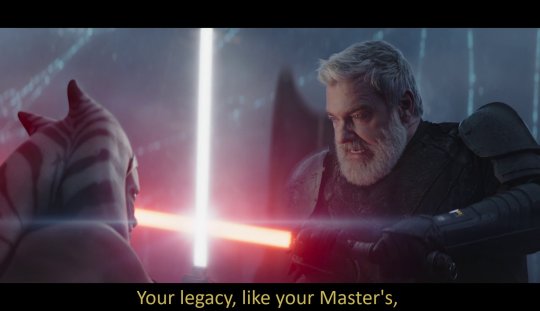
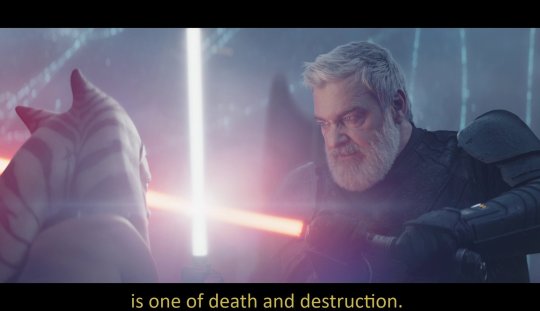
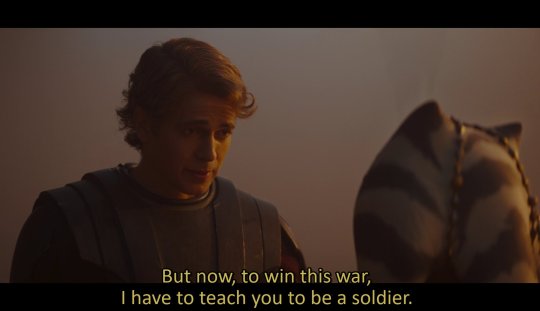
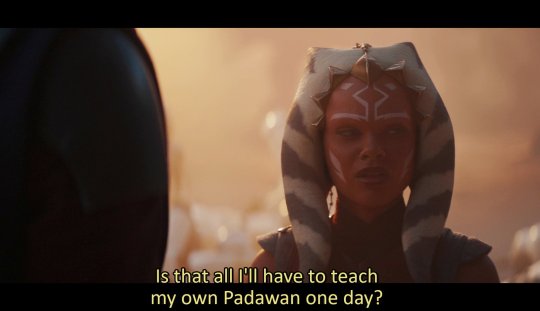
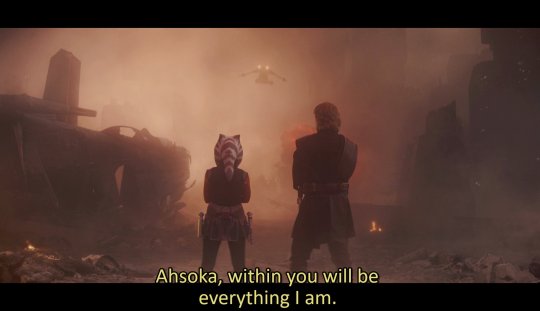
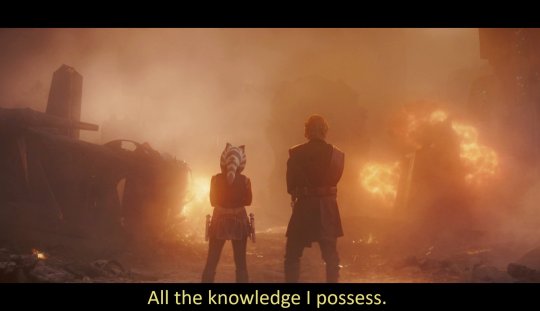
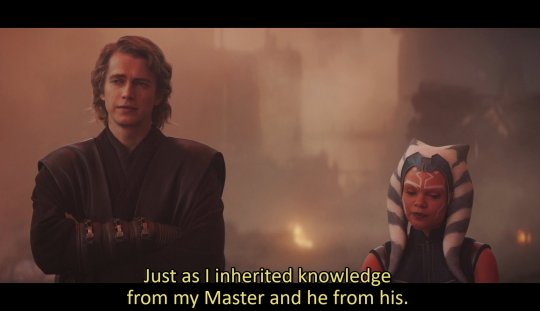

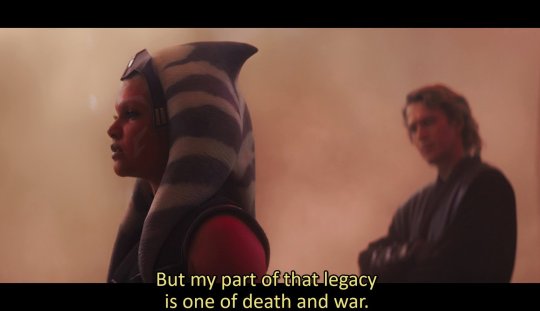
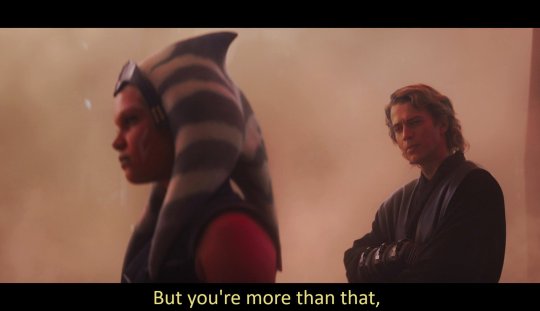

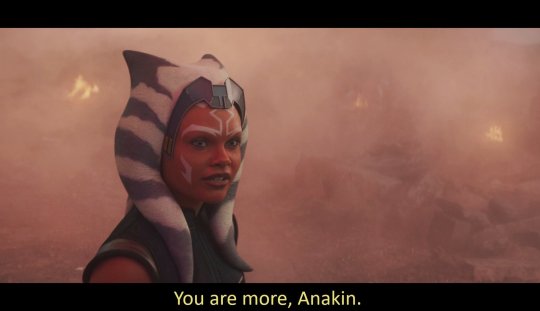

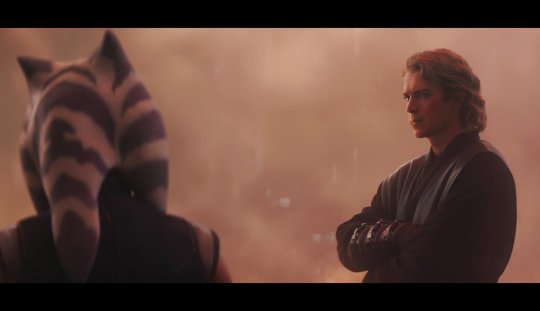
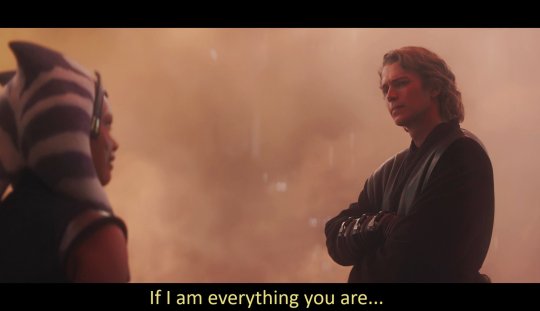


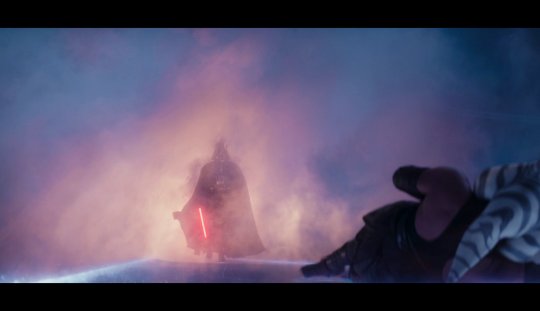
EVERY SINGLE MOMENT OF THIS WAS SUCH A FUCKING BANGER.
Baylan Skoll is reading exactly what Ahsoka fears and sets up this vision for her, that he says her legacy is one of death and destruction--which hurls her into a vision-slash-flashback of the clone wars, where she felt like this is all she learned as a Jedi, because this is what the galaxy was when she was growing up in it.
That this is Anakin--or Ahsoka's own mind using Anakin as a proxy, because she STILL emotionally and mentally sees him as the one who teaches her, even if it's not really him, she imagines it to be him, because he's her Master, the one who taught her what she needs to know--but also this is the center of everything she can't let go of, all the hurt and fear and loss, it's all tangled up in Anakin and what he became.
That she loves him and fears him in the same breath, that she remembers the good, the charming young man who was teaching her how to survive, who gave everything he had to her, while also remembering what he became, that he was so powerful that he became the worst nightmare the galaxy had ever seen, that neither of these is the whole of who he is, that he is all of this and more.
He isn't just Anakin Skywalker, he's also Darth Vader. He isn't just Darth Vader, he's also Anakin Skywalker. He isn't just Anakin and Vader, he's also everything of Obi-Wan, of Qui-Gon, of Dooku, of Yoda--and she has to learn to accept that the same is true of her, too.
The potential for tremendous darkness lurks in all their hearts, that's what the Jedi teach. No one is above the dark side. No one is above fear and clinging on and holding too tight. It's a lifelong journey not to give in to those things and you are so much more than just any one moment or even any one aspect.
Yes, if she's everything he is, then she does have the potential to become the same kind of nightmare of death and destruction that he did, just as she fears. It's why she's held herself back from the galaxy, from the Ghost crew, from Sabine especially, because she's afraid, and only agreed to train Sabine in the first place because whatever abilities she has, they're so low Sabine can't become another Vader. Grogu does have the potential to become another Vader. Ahsoka does have the potential to become another Vader. She has killed many and destroyed so much.
But that's not all she is. She's also saved so many lives. She also gently tucked Roo Roo Page back into her mother's arms. She also taught Petro and Katooni and Gungi and Zatt and Byph about how to get their crystals. She also saved Kaeden's life. She also protected Ezra from Vader.
She's all those things, plus more, just as Anakin was all the things he was and more, too. Baylan was right that part of her legacy is death and destruction, but he's a dark sider, he lies and twists the truth, and the truth is--Ahsoka Tano, like every Jedi before her, is more than just one part of her legacy.
#star wars#ahsoka series#ahsoka spoilers#anakin skywalker#ahsoka tano#baylan skoll#jedi order#meta#long post
3K notes
·
View notes
Text
so fallen order and survivor got me thinking.
Cal is....18 in Fallen order. (Had to double check but yes).
He had just made it to (our?) adulthood in the game. Recently, is my guess based on the "Five" correction to Prauf.
Was he surprised by it, when the day hit and he turned 18? Was he relieved, proud, maybe? Or was it just another day for him? Did he wonder if he'd make it to 18 in those five years prior?
What about other padawans - who did or didn't make it to their adulthood?
Was there a "but I'm not even an adult yet!" if they were found? Or "I made it to adulthood..." stray thought? What happened, when the children became adults?
And how did people who watched the temple burn from afar mentally justify killing literal children?
#star wars#order 66 meta#jedi fallen order#jedi fallen order meta#order 66#jedi meta#star wars meta#and the kids who made it to being a teenager and then *maybe* adulthood if they were lucky. what were they feeling???#look i made myself sad yall and y'all gotta suffer with me now sorrry
5 notes
·
View notes